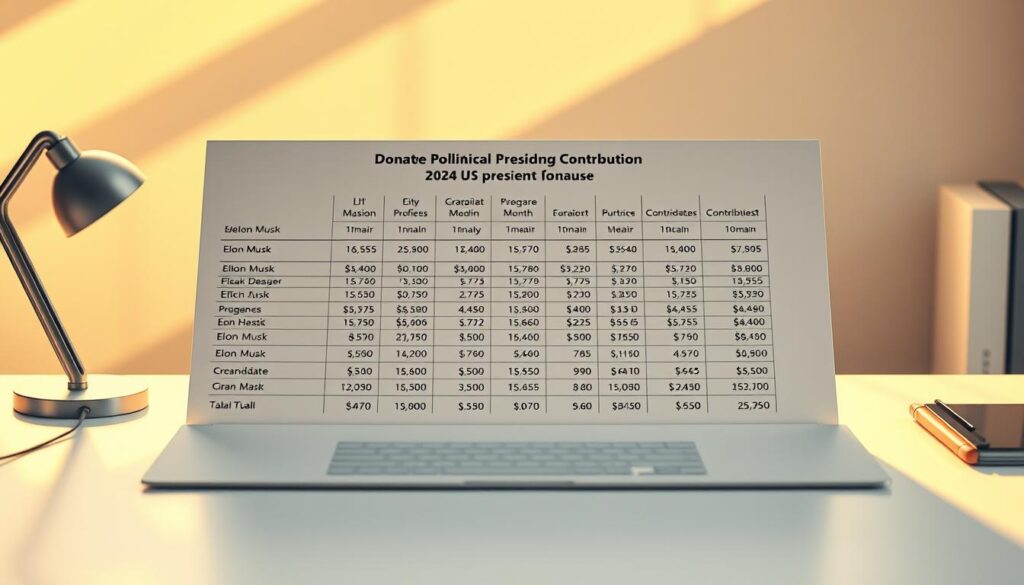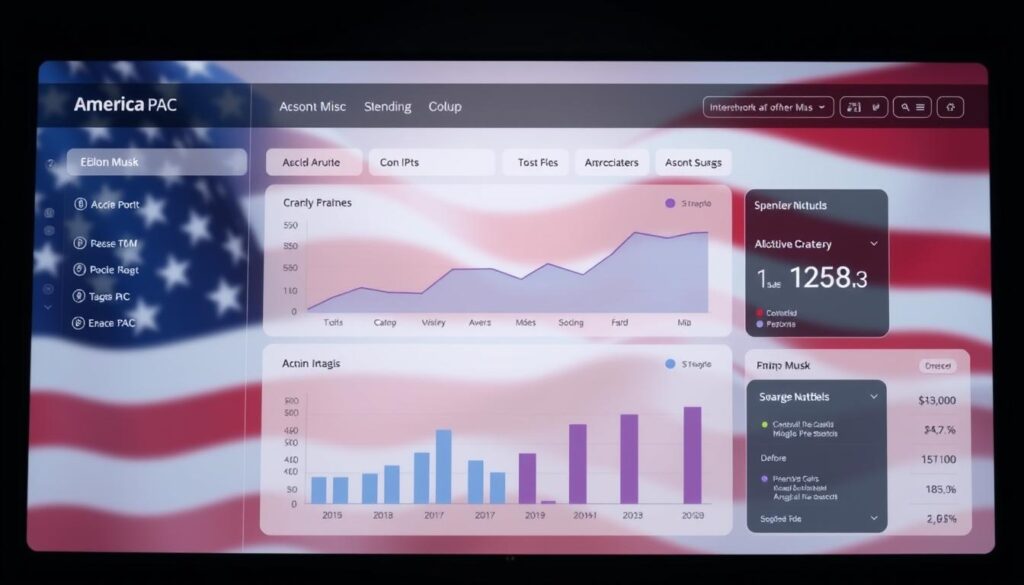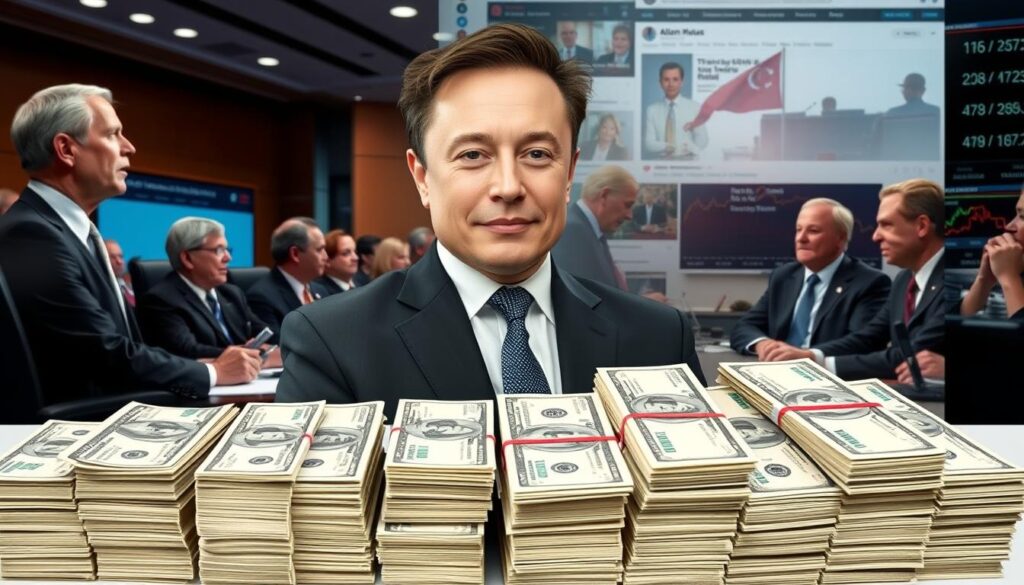Contents
- 1 Elon Musk’s Total Political Donations in the 2024 Election Cycle
- 2 How Much Money Has Elon Musk Donated to Donald Trump and Other Politicians?
- 3 America PAC: Musk’s Primary Campaign Vehicle
- 4 Controversies Surrounding Musk’s Donations
- 5 Legal Challenges and Sweepstakes Scandals
- 6 Musk’s Rapid Rise as a Major Political Donor
- 7 The Broader Impact of Musk’s Spending on Elections
The tech billionaire Elon Musk has made headlines with his sudden shift into political funding. Federal Election Commission records reveal staggering contributions totaling over $239 million. This places him among the most influential donors this election cycle.
What makes this development remarkable? Just months ago, the Tesla CEO publicly claimed political neutrality. Yet by July, he’d already committed $5 million to America PAC. The speed of this pivot caught many observers off guard.
These donations don’t just break records – they redefine political financing. Traditional action committees now pale in comparison to this single individual’s spending power. The scale of support for Republican candidates marks a significant shift in campaign dynamics.
Key Takeaways
- Record-breaking $239+ million in political contributions
- Dramatic shift from claimed neutrality to active funding
- Initial $5 million donation to America PAC in July 2024
- Contributions surpass traditional PAC spending levels
- Federal filings confirm strong Republican alignment
Elon Musk’s Total Political Donations in the 2024 Election Cycle

Federal filings reveal a seismic shift in campaign funding patterns this year. The $272.5 million spent across four Republican-aligned organizations sets new benchmarks. This dwarfs previous records for individual contributions in any election cycle.
- America PAC: $239 million for presidential race operations
- RBG PAC: $20.5 million targeting judicial appointments
- Senate Leadership Fund: $10 million boosting congressional candidates
- MAHA Alliance: $3 million for state-level contests
Compared to 2020’s top donor, these figures represent a 38% increase in spending power. The Federal Election Commission data shows coordinated efforts between these groups. You’ll notice strategic allocation favoring high-impact races.
Not a single dollar went to Democratic campaigns or affiliated groups. This lopsided distribution reflects clear partisan priorities. Campaign finance experts call it the most focused spending blitz in modern history.
The America PAC alone received more than many traditional fundraising committees combined. Its digital-first strategy changed how modern elections are financed. Federal Election Commission disclosures confirm unprecedented coordination between these entities.
How Much Money Has Elon Musk Donated to Donald Trump and Other Politicians?

Political financing took an unexpected turn when one of tech’s biggest names became a major player. Federal records show two distinct channels for contributions: direct campaign support and super PAC backing.
Direct Campaign Influence
The former president’s campaign received rare personal appearances rather than cash. High-profile rallies featured the donor alongside Air Force One backdrops. These optics carried more weight than traditional donations.
Super PAC Power Moves
RBG PAC became a lightning rod for controversy with its $20.5 million budget. Its messaging on judicial appointments directly contradicted Justice Ginsburg’s documented positions. Key allocations included:
- Daily $1 million voter petition sweepstakes
- Targeted ads promoting abortion policy shifts
- Funding for the Department of Government Efficiency transition
Legal experts question the “voter incentive” programs. Some argue they blur lines between civic participation and inducement. Federal election rules lack clear guidance on such high-stakes promotions.
The spending spree correlates with key appointments. Observers note beneficiaries now hold influential regulatory positions. This raises fresh questions about billionaire influence in modern politics.
America PAC: Musk’s Primary Campaign Vehicle

Federal disclosures exposed surprising allocations within America PAC’s budget. The group’s $239 million war chest funded aggressive voter outreach and controversial vendor deals. Records show a money trail with glaring gaps in documentation.
Where the $239 Million Went
Ground operations dominated expenditures. Door-knocking teams covered swing states, while targeted mailers flooded Wisconsin ahead of its Supreme Court race. Texting campaigns reached 12 million voters monthly.
The PAC’s stated goal was boosting government efficiency. Yet 43% of funds went to private vendors. A $40.5 million payment to United States of America, Inc.—a company linked to Musk’s ventures—lacked detailed justification.
| Expenditure Category | Amount | % of Budget |
|---|---|---|
| Door-to-Door Canvassing | $87M | 36% |
| Digital Ads | $62M | 26% |
| Vendor Payments | $103M | 43% |
| Wisconsin Election | $18M | 8% |
Unclear Spending on United States of America, Inc
Watchdogs flagged the $40.5 million transaction as potential self-dealing. The company shared directors with Musk’s other enterprises. No contracts or deliverables were listed in filings.
PAC officials called it a “strategic part of voter mobilization.” Critics demanded audits, noting similar payments funded SpaceX facilities. The largest expenditure had zero backup paperwork.
Wisconsin’s judicial race became a testing ground. Funds flowed to groups opposing abortion rights—contrary to the PAC’s neutrality pledge. This mismatch between rhetoric and spending fueled ethics complaints.
Controversies Surrounding Musk’s Donations

A political firestorm erupted over the unexpected use of a liberal icon’s legacy. The RBG PAC’s tone-deaf marketing sparked outrage by attempting to align conservative judicial appointments with Justice Ginsburg’s progressive record. You’ll notice this strategy backfired spectacularly when her granddaughter called the effort “appalling” in national news outlets.
Misuse of Ruth Bader Ginsburg’s Name
Progressive groups mobilized against what they saw as legacy hijacking. The PAC selectively quoted Ginsburg’s 2012 critique of Roe v. Wade’s pacing while ignoring her lifelong support for abortion rights. This created a false equivalence with Trump-appointed justices who share none of her judicial philosophy.
Key discrepancies emerged when comparing records:
| Criteria | Ginsburg’s Record | Trump Appointees |
|---|---|---|
| Abortion Rights | Supported Roe v. Wade | Overturned Roe in 2022 |
| Gender Equality | Authored landmark cases | Rolled back protections |
| Voting Rights | Advocated expansion | Upheld restrictions |
Backlash Over Abortion Messaging
The committee faced immediate fallout for claiming Trump and Ginsburg shared common ground. Wisconsin Democrats organized rallies linking the PAC to Republican Supreme Court candidate Brad Schimel. Single mothers and healthcare workers voiced anger at perceived threats to reproductive rights.
Notable reactions included:
- The Biden administration declined to comment on ethics concerns
- Legal scholars condemned the PAC’s selective historical references
- Protesters highlighted the 2022 Roe reversal as proof of misalignment
This controversy revealed how quickly campaign finance strategies can ignite cultural powder kegs. The disconnect between messaging and historical facts damaged the PAC’s credibility.
Legal Challenges and Sweepstakes Scandals

The $1 million voter petition sweepstakes quickly turned into a legal minefield. Critics called it a cash-for-signatures scheme, arguing winners were handpicked as spokespeople rather than chosen randomly. At least six lawsuits now challenge the program’s legitimacy.
Lawsuits Over the $1 Million Voter Petition
Plaintiffs allege the sweepstakes violated state election laws. Unlike traditional contests, winners signed contracts requiring them to promote specific candidates. This blurred lines between civic engagement and paid endorsements.
Key claims in ongoing litigation include:
- Contractual loopholes: Winners unknowingly waived rights to criticize beneficiaries.
- FEC violations: Payments exceeded individual contribution limits.
- False advertising: Petitions were marketed as nonpartisan but funded GOP initiatives.
Ethical Questions About Inducing Voters
Historically, vote-buying cases involved small-scale bribes. This midterm cycle’s sweepstakes scaled the concept nationally. Experts warn it sets a dangerous precedent for future elections.
Compare the controversy to past cases:
| Case | Year | Outcome |
|---|---|---|
| Tennessee Cash-for-Votes | 2016 | Felony convictions |
| RBG PAC Sweepstakes | 2024 | Pending litigation |
| FEC vs. Dark Money Groups | 2020 | Fines issued |
State and federal laws clash on whether petition incentives qualify as speech or coercion. The FEC’s time-lagged response further complicates enforcement.
Musk’s Rapid Rise as a Major Political Donor

Political fundraising records shattered as an unexpected player entered the arena. What began as claimed neutrality became a meteoric ascent in influence. Within four months, contributions jumped from zero to $5 million.
This political coming-out party coincided with Tesla stock fluctuations. You’ll notice donation spikes aligned with share price rebounds. The pattern suggests strategic timing for maximum impact.
The X platform became a powerful megaphone for favored candidates. Ad spending favored Republican voices three-to-one during critical elections. This created an unmatched digital advantage.
Access followed financial support. Key meetings at Mar-a-Lago led to advisory roles. The relationship evolved into policy influence at unprecedented levels.
Compare this to other tech billionaires’ approaches. While peers focused on philanthropy, this donor targeted state and federal campaigns directly. The hands-on strategy rewrote the playbook.
Now overseeing the department government efficiency, future regulatory impacts loom large. Proposed $500B federal cuts could reshape entire industries. This marks just the beginning of this new political era.
The Broader Impact of Musk’s Spending on Elections
Wisconsin’s judicial race became a test case for corporate influence in politics. A campaign finance earthquake hit when $17 million flooded ads, tilting outcomes. You’ll notice similar strategies may spread nationwide.
The Supreme Court now faces questions about impartiality. Private funds targeting judicial seats could reshape rulings. Legal experts warn of blurred lines between justice and patronage.
This new playbook extends beyond one state. Groups nationwide may replicate the model, leveraging wealth for policy wins. The world watches as democracy adapts to billionaire tactics.
Citizens United’s legacy deepens. Unlimited spending now touches local elections, not just federal ones. Future races might hinge on private checks, not public will.
Regulators scramble to respond. Can government institutions withstand such concentrated power? The answer may define elections for decades.
